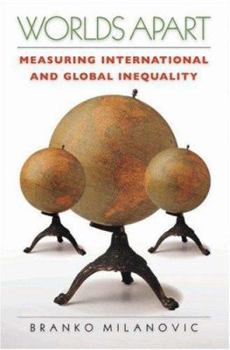Worlds Apart: Measuring International and Global Inequality
Select Format
Select Condition 
Book Overview
We are used to thinking about inequality within countries--about rich Americans versus poor Americans, for instance. But what about inequality between all citizens of the world? Worlds Apart addresses just how to measure global inequality among individuals, and shows that inequality is shaped by complex forces often working in different directions. Branko Milanovic, a top World Bank economist, analyzes income distribution worldwide using, for the...
Format:Hardcover
Language:English
ISBN:0691121109
ISBN13:9780691121109
Release Date:May 2005
Publisher:Princeton University Press
Length:240 Pages
Weight:1.05 lbs.
Dimensions:0.8" x 6.0" x 9.3"
Customer Reviews
2 ratings
An important book on global inequality
Published by Thriftbooks.com User , 16 years ago
Branko Milanovic is an economist with the World Bank, who specializes in studying income inequality and poverty. This work is an intriguing analysis of inequality in the world. It is also useful in that he also discusses all the problems with measuring exactly how much inequality there is between nations and even within nations. He begins by noting that the common currency for individual and national level income can't simply be per capita income, since some currencies have greater purchasing power than others. Even if one reduce all monetary systems to the dollar, the same problem exists. In some countries the dollar will buy a lot more because prices of goods and services are pitched so low; but if those people then go to the United States or Western Europe, their dollars won't go very far at all. So, Milanovic opts for what he calls "Purchasing Power Parity." Then, he discusses various ways of determining the extent of income inequality within countries. Readers will be introduced to that hardy statistic, the Gini Index, as well as other approaches to the subject. The heart of the book is an analysis of global income inequality. One of his findings is rather troubling. Most countries never advance up the ranks from the lowest tier (4th world); more countries are apt to drop from higher to lower tiers. He traces the dynamics from 1960 to 1978 to 2000, and the picture depicted is not very pretty. The world is not becoming more equal in terms of income distributions within societies in the near past. He explores many other issues over the course of this book, but the preceding provides a clue as to what he is dealing with in this volume. His conclusion? Only a world government can attack global economic inequality. Logically, it makes sense. Practically, it has two chances of coming about--slim and none, and slim has left town (to use the old phrase). Perhaps readers will disagree with my assessment of the likelihood of this solution coming about. But that is the stuff of debate and discussion over important issues. Overall, not always easy to plow through, but it is an intriguing book and it raises quite a few issues that are sure to stir debate.
Very good!
Published by Thriftbooks.com User , 18 years ago
Anyone interested in the distribution of income on an international and world basis must read this book. It is a thorough and rich analysis of the topic. The best of its kind!






